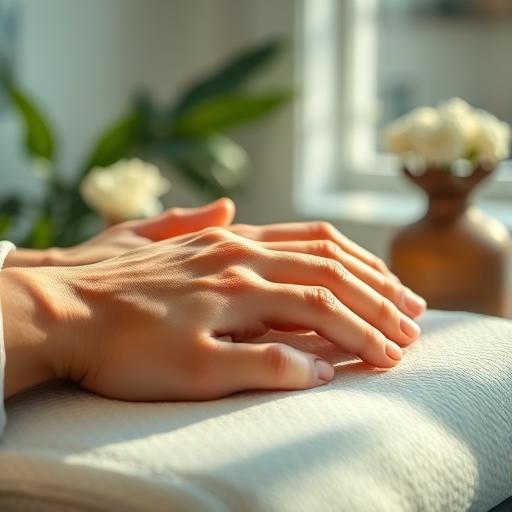Beyond the Spa Day: What is Therapeutic Massage?
When you hear the word “massage,” you might picture a fluffy robe and cucumber water. While that sounds lovely, therapeutic massage is a bit different. It’s a goal-oriented approach where a trained therapist manipulates the soft tissues of your body to produce a specific health outcome. The Benefits of Therapeutic Massage are not just about feeling good for an hour; they are about creating lasting positive changes in your body and mind.
Think of it as a targeted treatment. Whether you’re dealing with chronic back pain, recovering from a sports injury, or managing constant stress, this practice is designed to address your unique needs. A registered massage therapist will assess your condition and apply techniques to reduce pain, improve movement, and support your body’s natural healing processes. It’s a proactive step in your self-care routine.
Unwind Your Mind: The Stress-Busting Power
Let’s talk about stress. That constant feeling of pressure can wreak havoc on your health, and massage is one of the best ways to fight back. Scientific studies have shown that massage therapy can significantly lower levels of cortisol, the body’s primary stress hormone. As the therapist works on your tense muscles, your nervous system gets the message to calm down, shifting you from a “fight or flight” state to one of “rest and digest.”
At the same time, this hands-on therapy encourages the release of mood-boosting neurotransmitters like dopamine and serotonin. This is why you often feel a sense of calm and happiness after a session. It’s not just in your head; it’s a genuine chemical response that helps improve your mood, reduce anxiety, and give you a clearer perspective.
Soothe Sore Muscles and Manage Pain
Got a nagging ache in your neck or a lower back that won’t quit? Therapeutic massage is a fantastic, non-invasive method for pain management. The pressure applied during a session helps to release trigger points, or “knots,” which are tight bands of muscle that can cause pain both locally and in other parts of the body. It also increases blood flow to sore areas, which brings oxygen and nutrients that speed up recovery.
For those with chronic pain conditions, massage can offer a welcome reprieve. It works by interrupting pain signals sent to the brain, a concept known as the “gate control theory of pain.” By providing pleasant, non-painful stimulation to the skin and muscles, massage can effectively “close the gate” on pain signals, offering natural relief without the side effects of medication.
Get Your Blood Flowing: Circulatory Perks
Proper circulation is key to good health, as it ensures that your blood delivers oxygen and nutrients to every cell in your body. The kneading and stroking motions of a massage physically encourage blood to move through congested areas. This simple action helps get freshly oxygenated blood to tissues that might be deprived, which promotes healing and overall vitality.
This boost in circulation has another wonderful effect: it can help lower blood pressure. As your body relaxes and your blood vessels dilate, your heart doesn’t have to work as hard to pump blood. Regular massage sessions have been linked to sustained reductions in both systolic and diastolic blood pressure, making it a great complementary therapy for heart health.
A Stronger Shield: Boosting Your Immune System
Believe it or not, a good massage can give your immune system a helping hand. Research has demonstrated that even a single massage session can produce measurable changes in the body’s immune response. Specifically, it can increase the number of lymphocytes, which are the white blood cells that play a large role in defending the body from disease.
A big part of this immune boost comes back to stress reduction. Chronic stress and high cortisol levels are known to suppress immune function, making you more susceptible to getting sick. By lowering cortisol, massage helps take the brakes off your immune system, allowing it to function at its best and keep you healthier year-round.
The Secret to Better Sleep
Tossing and turning all night? A massage might be just what you need to achieve deeper, more restorative sleep. The practice has been shown to increase delta waves in the brain, which are the brain waves most associated with the deep stages of sleep. This is the period when your body does most of its physical and mental repair work.
It’s a simple chain reaction. When your muscles are relaxed and your mind is calm, it’s much easier to drift off and stay asleep. By alleviating the pain and anxiety that often interfere with rest, a massage sets the stage for a truly peaceful night. You’ll wake up feeling more refreshed and ready to take on the day.
Move Freely: Improving Flexibility and Range of Motion
Whether you’re an athlete looking for a competitive edge or someone who sits at a desk all day, stiffness can be a real problem. Therapeutic massage works directly on your muscles, connective tissues, tendons, and ligaments to keep them pliable and healthy. This helps to release tension, break down adhesions, and improve your overall flexibility.
Increased flexibility means a greater range of motion in your joints. This not only helps you perform daily activities with more ease but also reduces your risk of injury. When your muscles are supple and your joints can move freely, you’re less likely to suffer strains and sprains during physical activity. It’s an investment in keeping your body moving well for years to come.

